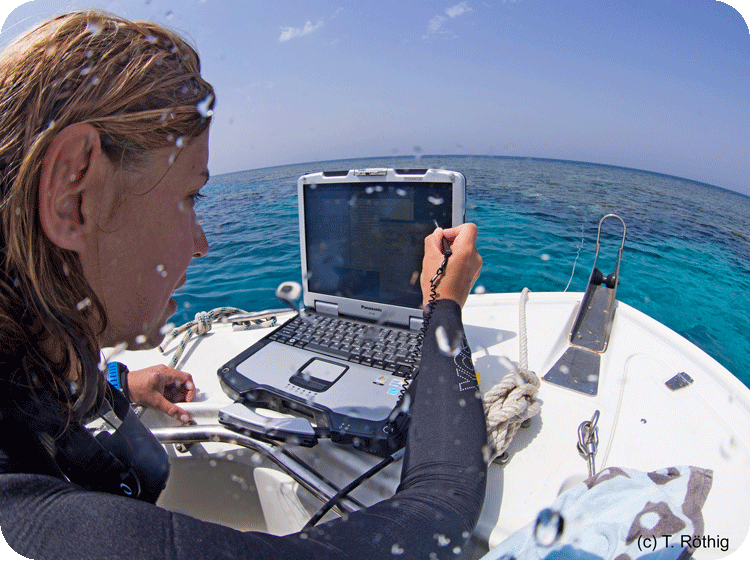About me
I am a marine scientist and interested in advancing our knowledge of the tropical coral reef ecosystems.
I have studied reef-building corals in the Caribbean, the Red Sea, and in south-east Asia, Thailand, which are all threatened by climate change and human activities. Currently, I investigate whether and how we could employ beneficial microbes or manipulate microbiomes to enhance stress resistance of reef-building corals. I am testing microbiome tranplantation strategies and marine probiotics. I explain these promising ideas further below, so please scroll down!
Aside from doing research, I use my camera to capture contemporary coral reefs to share the beauty of these underwater worlds. You can appreciate the magic of coral reef landscapes and their enigmatic inhabitants from the comfort of your own home by viewing my reef photo gallery!
PROJECTS
Ongoing & past
research projects
PUBLICATIONS
Scientific & other
publications
CV
My career and affiliations
REEF PHOTOS
Photography Projects
Microbiome-based therapies for reef-building corals
This project aims to advance our understanding of coral microbiome functioning and the development of ‘coral probiotics’ and other methods for microbiome manipulation which promise to assist corals to survive rapid climate change.
Climate-induced ‘coral bleaching events’ have driven significant habitat degradation in coral reefs over only the past few years. Science-based conservation strategies that offer sustainable and efficient solutions are urgently needed to prevent further losses.
Ocean warming is just progressing too rapidly for the long-lived reef-building corals to adapt. Here, the manipulation of the fast-evolving bacterial microbiome could enhance coral climate resilience within one generation.
Microbiome manipulation strategies such as probiotics or microbiome transplantations have been successfully employed in the food production sector (agri- and aquaculture), as well as in clinical treatments for humans to tweak the health and performance of host organisms. So our idea is now to adopt these approaches for corals to help them to buffer stressors or acclimatize on short times scales. A beneficial microbiome community could increase coral heat tolerance through mitigation of stress at the cellular and metabolic level, however mechanisms are yet to be understood in corals.
Topics and tools in this project:
- Microbiome manipulation experiments
- Next-generation sequencing, metabarcoding and metagenomics
- Eco-physiological measurements (in situ measurements of metabolism and coral tissue analyses)
Garcias-Bonet, N.*, A. Roik*, B. Tierney, F. C. García, H. D. M. Villela, A. M. Dungan, K. M. Quigley, M. Sweet, G. Berg, L. Gram, D. G. Bourne, B. Ushijima, M. Sogin, L. Hoj, G. Duarte, H. Hirt, K. Smalla, A. S. Rosado, S. Carvalho, R. V. Thurber, M. Ziegler, C. E. Mason, M. J. H. van Oppen, C. R. Voolstra, and R. S. Peixoto (2023) Horizon scanning the application of probiotics for wildlife. Trends in Microbiology. Cell Press https://doi.org/10.1016/j.tim.2023.08.012
Peixoto RS, Voolstra CR, Sweet M, Duarte CM, Carvalho S, Villela H,
Lunshof JE, Gram L, Woodhams DC, Walter J, Roik A, Hentschel U, Vega Thurber R,
Daisley B, Ushijima B, Daffonchio D, Costa R, Keller-Costa T, Bowman JS, Rosado
AS, Reid G, Mason CE, Walke JB, Thomas T, Berg G (2022) Harnessing the microbiome to prevent global biodiversity loss. Nat Microbiol, 1–10. DOI: 10.1038/s41564-022-01173-1. https://www.nature.com/articles/s41564-022-01173-1
Live Radio interview. Deutschland Funk Kultur 29th July 2022, “Korallen retten mit Mikroorganismen”
You, Me & HIFMB Podcast with host Dr. Jan-Claas Dajka: In a thunderous summer episode, we hear from Anna Roik – postdoc at HIFMB. Her work is centered around harnessing the microbiome (the collection of bacteria, viruses, fungi and their genes) on corals. She transplants the microbiome of more heat resistant corals onto that of heat susceptible ones to boost their resilience in the face of climate change.


Experiments 2023/24
Spring 2023 | We are ready to launch our follow-up study on coral microbiome transplantation. The major aim in this new project is to optimize and streamline protocols, explore the long-term effects of microbiome transfers between corals after transplanting recipients back into the reef. Stay tuned!
Winter 2023/24 | We are back to Thailand! Microbiome transplantation experiments in the Andaman Sea are ongoing with highly interesting results revealed after a first glimpse into the physiological data collected! Thanks to all team members to our new collaboration with Marine Holobiomics at Uni Gießen and PMBC, Phuket !

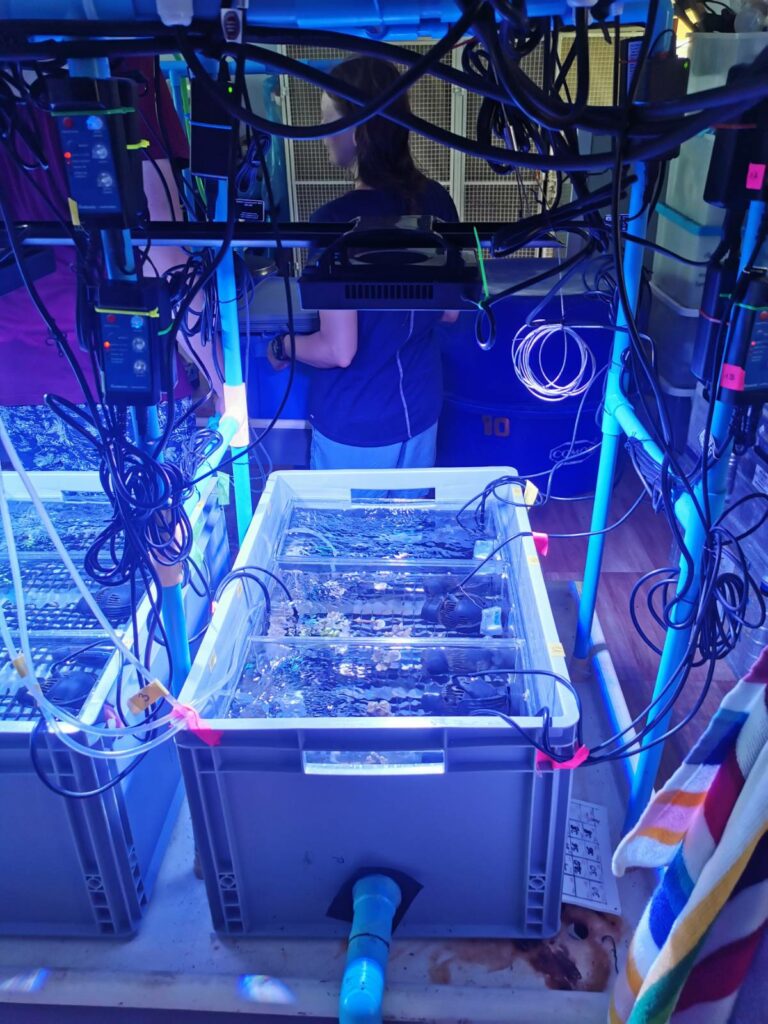
Experiments 2018 - 2021
Our first exerimental trials of coral microbiome tranplantation have been published with Microbiome Journal. Watch the Video Abstract to learn about our study!
Find out more about the perspectives and approaches of coral microbiome manipulation in our Nature and Cell Press publications.
The experiments were conducted as part of our ongoing German-Thai collaborative research projects. We are also proud to present the Thai-language version of our video abstract!
Mysterious coral (reef) associated fungi
In this project we have set out to explore the obscure world of marine fungi that inhabit coral reefs. These microbial communities (i.e., mycobiomes) are understudied in coral reefs and clearly deserve more of our scientific attention in future research efforts. Who knows, maybe we will come across some useful fungi which can help us protect the fragile reef-building corals.
We are in the stage of developing experiments and reef survey designs to tackle the first and most pressing question regarding the diversity and roles or marine fungi in reef environments. Soon, we will get the work started, so I invite you to come back follow up on our progress.
Meanwhile, please enjoy a read of our first review and perspective paper on coral fungi (see below).
Roik A, Reverter M, Pogoreutz C. (2022) A roadmap to understanding diversity and function of coral reef-associated fungi. FEMS Microbiol Rev, fuac028. DOI: 10.1093/femsre/fuac028 https://academic.oup.com/femsre/advance-article/doi/10.1093/femsre/fuac028/6615459
Interview: Meet the Winners of the 2022 Best Article Award From FEMS Microbiology Reviews. 2023. https://fems-microbiology.org/communities/meet-the-winners-of-the-2022-best-article-award-from-fems-microbiology-reviews/
News 2023
Our review paper on potential roles of coral associated-fungi got awarded best article of 2022 by FEMS Microbiology Reviews. We briefly give insights into what insipred us to get this piece underway. Read our interview with FEMS:
Updates 2022
Our first paper on coral reef associated fungi has been published as a review paper with FEMS Microbiology Reviews!
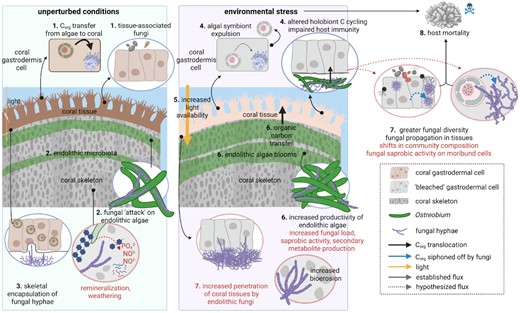
Coral plasticity, stress resilience and trade-offs
This project aims to learn about the baselines and limits of coral stress resistance (aka. plasticity). Can we prime corals with mild environmental stressors to enhance their resilience? Can this prepare corals resist current and future stressors? What are the metabolic shifts and inflicted trade-offs of such gained/enhanced stress resistance?
We are head out to answer all these questions using field (in situ) observations and manipulative (ex situ) experiments using indoor aquarium facilities.
The endeavor of developing science-based remedies for the coral reef crisis primarily aims to enhance coral climate stress resilience and thus depends on our knowledge of the mechanisms underlying coral stress. Understanding the differences between corals that are able to efficiently resist stressors than others can teach us important lessons.
Reef locations, where coral stress resistance under high temperatures has been observed, exist in many places globally. Corals living under naturally fluctuating or extreme environments are likely more stress tolerant compared to conspecifics in stable environments. This has fostered the hypothesis of environmentally-mediated priming which we explore in this project.
Additionally, we work on improvements of the practicability and accuracy of coral stress response assessment techniques. Such stress response assays for corals are not only vital for the study of the plasticity of stress resilience, but also urgently needed to enable rapid surveys in natural population identifying stress tolerant corals for the purposes of reef management and restoration efforts.
Topics and tools:
• Environmental priming in the wild
• Preconditioning of corals artifically (elevated temperature, simulated variability)
• High-throughput short-term heat stress assays for corals
• Coral health and fitness variables
• Reef monitoring
Wall, M., T. Doering, N. Pohl, L. Putchim, T. Ratanawongwan, and A. Roik. (2023) Natural thermal stress-hardening of corals through cold temperature pulses in the Thai Andaman Sea. bioRxiv. https://www.biorxiv.org/content/10.1101/2023.06.12.544549v1
Roik, A., M. Wall, M. Dobelmann, S. Nietzer, D. Brefeld, A. Fiesinger, M. Reverter, P. J. Schupp, M. Jackson, M. Rutsch, and J. Strahl (2023) Trade-offs in a reef-building coral after six years of thermal acclimation. bioRxiv. https://www.biorxiv.org/content/10.1101/2023.07.20.549699v1

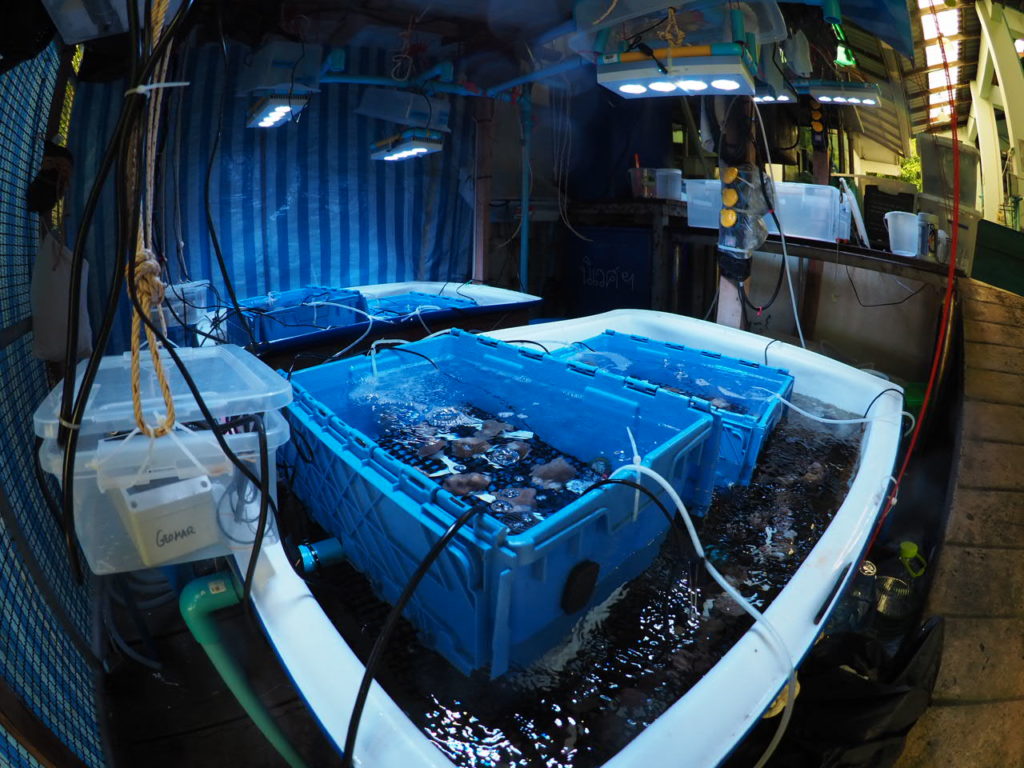
Coral reef functioning in the Red Sea
This project acquired several full-year, in situ data sets of physicochemical variables, macro and microbial community patterns, and reef growth in coral reefs along an environmental cross‐shelf gradient. These data enabled thorough analyses of the dynamic interplay of abiotic and biotic factors. Important seasonal baseline data and reef carbonate budgets of the reefs in the central Red Sea were delivered.
Coral reefs in the central Red Sea are sparsely studied and baseline data on physicochemical and key biotic variables are missing. Despite high temperature and salinity conditions that challenge reef growth in other oceans, the Red Sea maintains amongst the most diverse and productive coral reefs worldwide. Understanding of ecosystem functioning in this region promises to contribute novel insights of coral reefs in challenging environments and help predict coral reef trajectories under climate change consequences.
Topics and tools:
• Long-term coral reef monitoring
• Ocean sensing
• Line-intercept transects
• Coral calcification
• Carbonate budgets
• Abiotic-biotic interactions
• Bacterial ecology of coral reefs
• Coral reef biofilms
• Next-generation sequencing (metabarcoding)
Roik A, Röthig T, Pogoreutz C, Saderne V, Voolstra CR (2018) Coral reef
carbonate budgets and ecological drivers in the central Red Sea – a naturally
high temperature and high total alkalinity environment. Biogeosciences, 15:6277–6296. DOI: 10.5194/bg-15-6277-2018. https://www.biogeosciences.net/15/6277/2018/
Ziegler M, Roik A, Röthig T, Wild C, Rädecker N, Bouwmeester J, Voolstra CR (2019) Ecophysiology of Reef-Building Corals in the Red Sea. In: Voolstra CR, Berumen ML (eds.) Coral Reefs of the Red Sea, Coral Reefs of the World 11, Springer. DOI: 10.1007/978-3-030-05802-9_3. https://www.springerprofessional.de/ecophysiology-of-reef-building-corals-in-the-red-sea/16706732
Roik A, Ziegler M, Voolstra CR (2019) Physicochemical Dynamics, Microbial Community Patterns, and Reef Growth in Coral Reefs of the Central Red Sea. In: Rasul N., Stewart I. (eds) Oceanographic and Biological Aspects of the Red Sea. Springer Oceanography. Springer, Cham. DOI: 10.1007/978-3-319-99417-8_22. https://link.springer.com/chapter/10.1007/978-3-319-99417-8_22
Roik A, Röthig T, Roder C, Ziegler M, Kremb SG, Voolstra CR (2016) Year-Long monitoring of physico-chemical and biological variables provide a comparative baseline of coral reef functioning in the central Red Sea. PLoS ONE 11(11): e0163939. DOI: 10.1371/journal.pone.0163939. http://journals.plos.org/plosone/article?id=10.1371/journal.pone.0163939
Roik A, Roder C, Röthig T, Voolstra CR (2015) Spatial and seasonal reef calcification in corals and calcareous crusts in the central Red Sea. Coral Reefs: 1–13, DOI: 10.1007/s00338-015-1383-y. https://link.springer.com/article/10.1007/s00338-015-1383-y
Röthig T, Spaet JLY, Kattan A, Schulz IK, Roberts M, Roik A, Voolstra CR (2015) Repeated observations of cetaceans and carcharhiniformes associations in the Red Sea. Marine Biodiversity. DOI: 10.1007/s12526-015-0356-2. https://link.springer.com/article/10.1007/s12526-015-0356-2
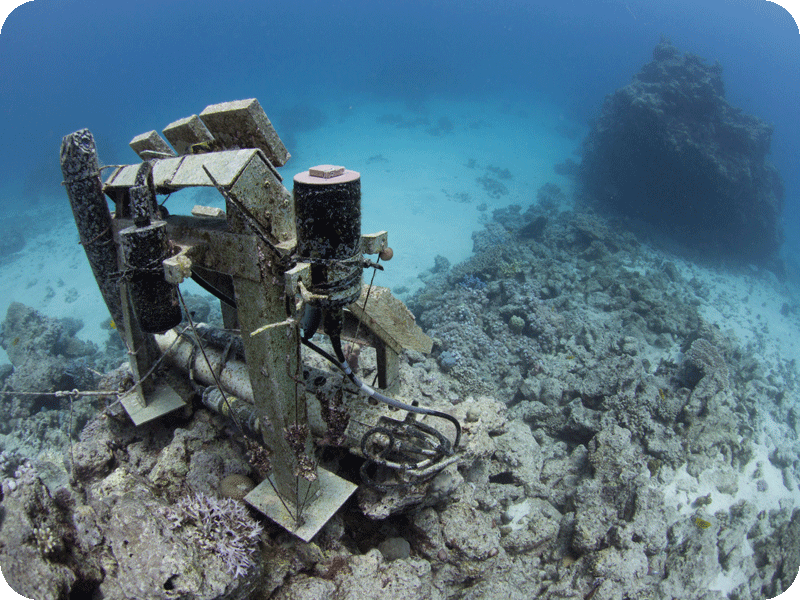
Physiological plasticity of deep sea corals in the Red Sea
This project reported on the occurrence and biology of deep sea corals in the Red Sea focusing on their specific adaptation strategies which help them colonize the deep Red Sea.
The coral Eguchipsammia fistula is a cold water, aposymbiotic coral. It is a cosmopolitan species which occurs across the southern hemisphere. This research project specifically documented the occurrence of this cosmopolitan coral in the comparably warm (>20 ◦C), oxygen- and nutrient-limited deep sea habitats of the Red Sea. Its ability to cope with these specific conditions is indicative of its remarkably wide physiological plasticity, which makes the species a valuable cold water/ deep sea coral model to study mechanisms of acclimation and adaptation.
Topics and tools:
• Deep sea coral collection and cultivation
• Physiological experiments
• Health and fitness measurements
• Bacterial communities
• Next-generation sequencing
Röthig T, Yum LK, Kremb SG, Roik A, Voolstra CR (2017) Microbial community composition of deep-sea corals from the Red Sea provides insight into functional adaption to a unique environment. Sci Rep 7:44714. DOI: 10.1038/srep44714.https://www.nature.com/articles/srep44714
Yum LK, Baumgarten S, Röthig T, Roder C, Roik A, Michell C, Voolstra CR (2017) Transcriptomes and expression profiling of deep-sea corals from the Red Sea provide insight into the biology of azooxanthellate corals. Sci Rep 7:6442. DOI:10.1038/s41598-017-05572-x. https://www.nature.com/articles/s41598-017-05572-x
Roik A, Röthig T, Roder C, Müller PJ, Voolstra CR (2015) Captive rearing of the deep-sea coral Eguchipsammia fistula from the Red Sea demonstrates remarkable physiological plasticity. PeerJ 3:e734, DOI: 10.7717/peerj.734. https://peerj.com/articles/734/
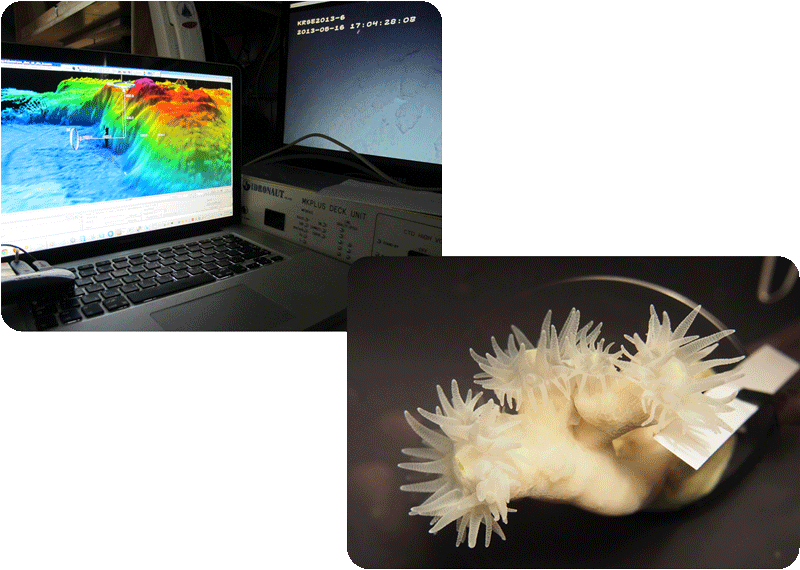
Coral bleaching in the central Red Sea
Coral reefs in the Red Sea were not spared during the 3rd global coral bleaching event in 2015/16. This project delivered observations of the benthic reef communities at the onset of the bleaching event and evaluated changes towards the end of the event in the central Red Sea.
Topics and tools:
• Coral reef bleaching surveys
• Line-intercept transects
Monroe AA, Ziegler M, Roik A, Röthig T, Hardenstine RS, Emms MA, Jensen T, Voolstra CR, Berumen ML (2018) In situ observations of coral bleaching in the
central Saudi Arabian Red Sea during the 2015/2016 global coral bleaching
event. PLoS ONE 13:e0195814. DOI: 10.1371/journal.pone.0195814. http://journals.plos.org/plosone/article?id=10.1371/journal.pone.0195814
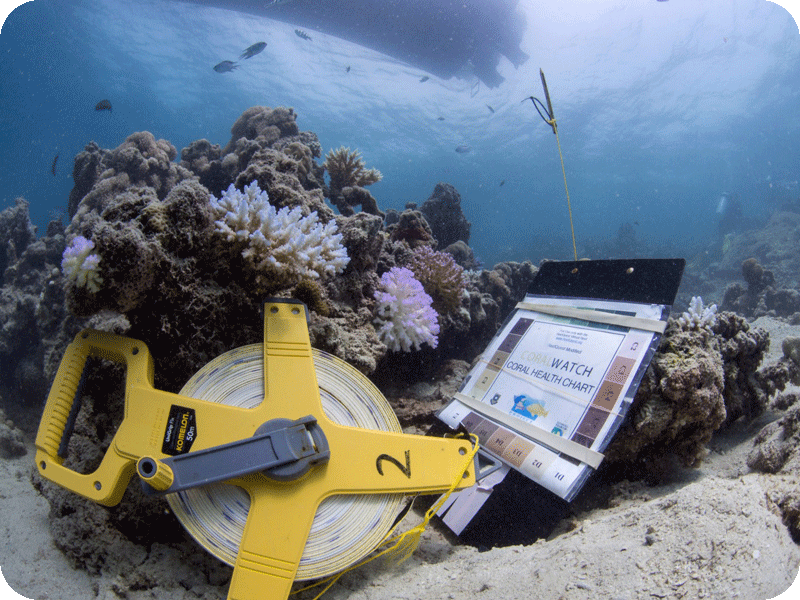
Coral reef restoration using sexual propgules
This project investigated coral reproduction and recruitment in the reefs of the southern Caribbean island of Curaçao and established techniques of ex situ coral sexual reproduction for the critically endangered coral species Acropora palmata and A. cervicornis.
Aiming to counteract the dramatic coral and reef habitat losses of the past few decades, coral reef restoration efforts are seeking to optimize and improve techniques of coral gardening and propagation. The use of sexual propagules is one such strategy to improve the survival of coral propagules outplanted into a damaged reef. In comparison to clonal coral fragments, sexually produced recruits carry a high genetic diversity which translates into a larger pool of resilience traits and will increase the survival rates in restored populations.
Topics and tools
• Conservation of endangered the coral Acropora palmata and A. cervicornis
• Coral gamete collection (coral spawning work)
• Surveys of natural coral recruitment patterns using photo transects
• Coral larvae cultivation
• Indoor and outdoor coral nurseries
• Skeletal growth monitoring
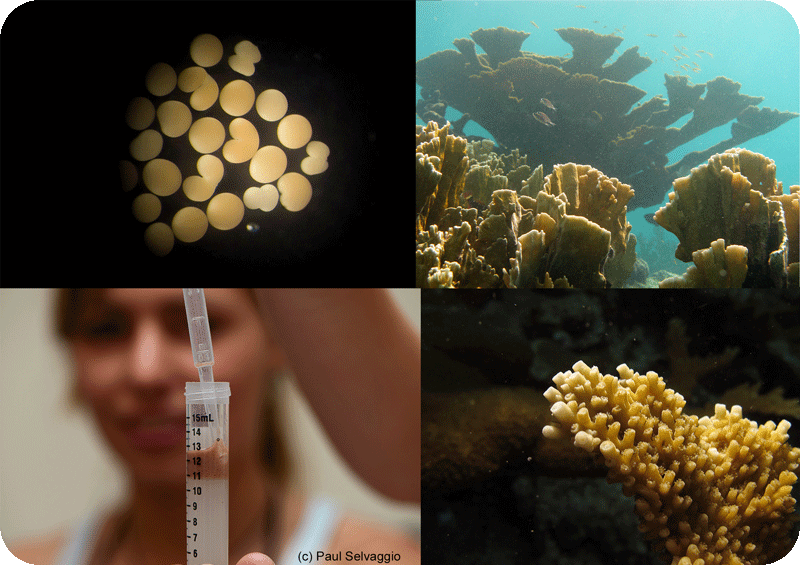
Employment
2021 – now: Helmholtz Institute for Functional Marine Biodiversity (HIFMB) at the University of Oldenburg, Germany
- Project PI of ‘The coral microbiome Project’
- HIFMB Integrative Postdoc Pool (HIPP) Fellow
- ICBM-Terramare, Wilhelmshaven
- Environmental Biochemistry Group, University of Oldenburg
2017 – 2021: GEOMAR Helmholtz Centre for Ocean Research Kiel, Germany
- Project PI of ‘The coral microbiome Project’
- ‘Future Ocean‘ DFG Cluster of Excellence Fellow
- Postdoctoral Fellow at the Marine Symbioses Lab
- CRC 1182 Origin and Function of Metaorganisms Research Fellow (Alumni Link)
2016 – 2017: Christian-Albrecht University Kiel CAU, Germany
- Postdocotral Fellow at the Institute for Microbiology
- CRC 1182 Origin and Function of Metaorganisms Research Fellow
2012 – 2016: King Abdullah University of Science and Technology KAUST, KSA
- PhD Candidate at the Reef Genomics Lab
- Red Sea Research Center
2010 – 2012: Ruhr-University Bochum RUB, Germany
- Junior Research Fellow at the Department for Animal Ecology, Evolution, and Biodiversity
- SECORE.org – at the Blijdorp Rotterdam Zoo, Netherlands
- Sea Aquarium Curaçao, Netherlands Antilles
Education
2012 – 2016: PhD Marine Science
- King Abdullah University of Science and Technology KAUST, KSA
2007 – 2010: Master Biology and Biotechnology
- Ruhr-University Bochum RUB, Germany
2007/08: Erasmus Scholar
- University College Cork UCC, Republic of Ireland
2003 – 2006: B.A. Biology and English Studies
- Ruhr-University Bochum RUB, Germany
Selected peer-reviewed research papers
- Garcias-Bonet, N.*, A. Roik*, B. Tierney, F. C. García, H. D. M. Villela, A. M. Dungan, K. M. Quigley, M. Sweet, G. Berg, L. Gram, D. G. Bourne, B. Ushijima, M. Sogin, L. Hoj, G. Duarte, H. Hirt, K. Smalla, A. S. Rosado, S. Carvalho, R. V. Thurber, M. Ziegler, C. E. Mason, M. J. H. van Oppen, C. R. Voolstra, and R. S. Peixoto. 2023. Horizon scanning the application of probiotics for wildlife. Trends in Microbiology. Cell Press https://doi.org/10.1016/j.tim.2023.08.012
- Peixoto RS, Voolstra CR, Sweet M, Duarte CM, Carvalho S, Villela H, Lunshof JE, Gram L, Woodhams DC, Walter J, Roik A, Hentschel U, Vega Thurber R, Daisley B, Ushijima B, Daffonchio D, Costa R, Keller-Costa T, Bowman JS, Rosado AS, Reid G, Mason CE, Walke JB, Thomas T, Berg G (2022) Harnessing the microbiome to prevent global biodiversity loss. Nat Microbiol, 1–10. DOI:10.1038/s41564-022-01173-1.
- Roik A, Reverter M, Pogoreutz C. A roadmap to understanding diversity and function of coral reef-associated fungi. (2022) FEMS Microbiol Rev, fuac028. DOI: 10.1093/femsre/fuac028 ***Winner of the best article award 2022***
- Doering T, Wall M, Putchim L, Ratanawongwan T, Schroeder R, Hentschel U, Roik A. Towards enhancing coral heat tolerance: A “microbiome transplantation” treatment using inoculations of homogenized coral tissues. (2021) Microbiome 9, 102, DOI:10.1186/s40168-021-01053-6
- Weiland-Bräuer N, Pinnow N, Langfeldt D, Roik A, Güllert S, Chibani CM, et al. The Native Microbiome is Crucial for Offspring Generation and Fitness of Aurelia Aurita.(2021) MBio, 11. doi:10.1128/mBio.02336-20
- Ziegler M, Roik A, Porter A, Zubier K, Mudarris MS, Ormond R, Voolstra CR (2015) Coral microbial community dynamics in response to anthropogenic impacts near a major city in the central Red Sea. Marine Pollution Bulletin, DOI: 10.1016/j.marpolbul.2015.12.045
- Roik A, Röthig T, Roder C, Ziegler M, Kremb SG, Voolstra CR (2016) Year-Long monitoring of physico-chemical and biological variables provide a comparative baseline of coral reef functioning in the central Red Sea. PLoS ONE 11(11): e0163939. DOI:10.1371/journal.pone.0163939
- Röthig T, Ochsenkühn MA, Roik A, van der Merwe R, Voolstra CR (2016) Long-term salinity tolerance is accompanied by major restructuring of the coral bacterial microbiome. Mol Ecol 25:1308–1323, DOI: 10.1111/mec.13567
- Wall, M., T. Doering, N. Pohl, L. Putchim, T. Ratanawongwan, and A. Roik. (2023) Natural thermal stress-hardening of corals through cold temperature pulses in the Thai Andaman Sea. bioRxiv. https://www.biorxiv.org/content/10.1101/2023.06.12.544549v1
- Roik, A., M. Wall, M. Dobelmann, S. Nietzer, D. Brefeld, A. Fiesinger, M. Reverter, P. J. Schupp, M. Jackson, M. Rutsch, and J. Strahl (2023) Trade-offs in a reef-building coral after six years of thermal acclimation. bioRxiv. https://www.biorxiv.org/content/10.1101/2023.07.20.549699v1
- Monroe AA, Ziegler M, Roik A, Röthig T, Hardenstine RS, Emms MA, Jensen T, Voolstra CR, Berumen ML (2018) In situ observations of coral bleaching in the central Saudi Arabian Red Sea during the 2015/2016 global coral bleaching event. PLoS ONE 13:e0195814. DOI: 10.1371/journal.pone.0195814.
- Roik A, Röthig T, Pogoreutz C, Saderne V, Voolstra CR (2018) Coral reef carbonate budgets and ecological drivers in the central Red Sea – a naturally high temperature and high total alkalinity environment. Biogeosciences 15:6277–6296
- Roik A, Roder C, Röthig T, Voolstra CR (2015) Spatial and seasonal reef calcification in corals and calcareous crusts in the central Red Sea. Coral Reefs: 1–13, DOI: 10.1007/s00338-015-1383-y
- Röthig T, Spaet JLY, Kattan A, Schulz IK, Roberts M, Roik A, Voolstra CR (2015) Repeated observations of cetaceans and carcharhiniformes associations in the Red Sea. Marine Biodiversity. DOI: 10.1007/s12526-015-0356-2.
- Röthig T, Yum LK, Kremb SG, Roik A, Voolstra CR (2017) Microbial community composition of deep-sea corals from the Red Sea provides insight into functional adaption to a unique environment. Sci Rep 7:44714. DOI: 10.1038/srep44714
- Röthig T, Roik A, Yum LK, Voolstra CR (2017) Distinct Bacterial Microbiomes Associate with the Deep-Sea Coral Eguchipsammia fistula from the Red Sea and from Aquaria Settings. Front Mar Sci 4: fmars.2017.00259. DOI: 10.3389/fmars.2017.00259.
- Yum LK, Baumgarten S, Röthig T, Roder C, Roik A, Michell C, Voolstra CR (2017) Transcriptomes and expression profiling of deep-sea corals from the Red Sea provide
insight into the biology of azooxanthellate corals. Scientific Reports 7:6442 - Roik A, Röthig T, Roder C, Müller PJ, Voolstra CR (2015) Captive rearing of the deep-sea coral Eguchipsammia fistula from the Red Sea demonstrates remarkable physiological plasticity. PeerJ 3:e734, DOI: 10.7717/peerj.734
For all my scientific publications please see Google Scholar
Book Chapters
Roik A, Ziegler M,Voolstra CR (2019) Physicochemical Dynamics, Microbial Community Patterns, and Reef Growth in Coral Reefs of the Central Red Sea. In: Rasul N., Stewart I.
(eds) Oceanographic and Biological Aspects of the Red Sea. SpringervOceanography. Springer, Cham. DOI: 10.1007/978-3-319-99417-8_22.
Ziegler M, Roik A, Röthig T, Wild C, Rädecker N, Bouwmeester J, Voolstra CR (2019) Ecophysiology of Reef-Building Corals in the Red Sea. In: Voolstra CR, Berumen ML (eds.) Coral Reefs of the Red Sea, Coral Reefs of the World 11, DOI: 10.1007/978-3-030-05802-9_3
Other Publications and Conference Contributions
INVITED TALKS
- 10th FEMS Congress of European Microbiologists FEMS2023, Hamburg, Germany, July 9 -13th, 2023 (Roik A, Pogoreutz C)
- Helmholtz Symposium ‘Changing Earth Sustaining our Future’, Kiel Science Center, Kiel, Germany, 21st June 2022
- Max-Planck-Institute for Marine Microbiology, Department of Symbiosis, Bremen, Germany, 22nd April 2021
- CRC 1182 Metaorganism Seminar, University of Kiel, Germany, 26th May 2020
- Thai-German Collaboration Workshop, Bentho-Pelagic Processes, Alfred-Wegener Institute, Bremerhaven, Germany, September 2019
- Phuket Marine Biological Center PMBC, Phuket, Thailand, March 2018
- Advances in Integrated Ocean Research Towards Sustainable Development Conference, University of Kiel, Germany, July 2017
- GEOMAR Helmholtz Centre for Ocean Research, RU3 Marine Ecology, Kiel, Germany, June 2017
- ‘Tropical marine ecosystems in a high-CO2 world’ Tarek Ahmed Juffali Workshop by Prof. CM Duarte and Prof. JP Gattuso, KAUST, Saudi Arabia, March 2016
CONFERENCE TALKS
- 5th Asia Pacific Coral Reef Symposium APCRS 2023, National University of Singapore, Singapore, 19 – 23th June 2023
- 14th International Coral Reef Symposium ICRS 2021, Bremen, Germany | Virtual, 19th – 23th July 2021,
- Coral Reefs of Arabia Symposium, New York University Abu Dhabi, UAE, February 2015
- International Conference on the Marine Environment of the Red Sea ICMERS, King Abdulaziz University, Saudi Arabia, November 2014
- 4th Young Reef Scientists Meeting YRMS, Justus-Liebig University, Giessen, Germany, 2013
- 12th International Coral Reef Symposium ICRS 2012, Cairns, Australia, 2012
POSTER PRESENTATIONS (*including students under my supervision)
- 2nd International Ocean Health Symposium, Kiel, Germany, 29th – 31st Aug 2022
- 18th International Symposium on Microbial Ecology ISME18, Lausanne, Switzerland,14th – 19th Aug 2022
- *18th International Symposium on Microbial Ecology ISME18, Lausanne, Switzerland,14th – 19th Aug 2022
- *3rd Symposium on Functional Marine Biodiversity at the Helmholtz Institute for Functional Marine Biodiversity at the University of Oldenburg, Germany, 7th – 8th September 2021
- *International Conference for Young Marine Researchers ICYMARE 2019, Bremen, Germany, 24th – 27th September 2019
- *CRC1182 Metaorganism YIRD Symposium, Kiel, Germany 27th June 2018
- *17th International Symposium on Microbial Ecology ISME17, Leipzig, Germany, 12th-17th Aug 2018
- Ocean Sciences Meeting OSM 2016, New Orleans, Lousiana, USA, 21st – 26th February 2016
CO-AUTHORED CONTRIBUTIONS
- ASLO Aquatic Sciences Meeting 2023, Palma de Mallorca, Spain, 4–9 June 2023
- Reef Conservation UK (RCUK), 14th Dec 2019, Zoological Society of London, UK, 2019
- Ocean Sciences Meeting OSM 2016, New Orleans, Lousiana, USA, 21st – 26th February 2016
- European Coral Reef Symposium ISRS 2010, Wageningen, The Netherlands, 13th – 17th December 2010
- You, Me & HIFMB Podcast with host Dr. Jan-Claas Dajka: In a thunderous summer episode, we hear from Anna Roik – postdoc at HIFMB. Her work is centered around harnessing the microbiome (the collection of bacteria, viruses, fungi and their genes) on corals. She transplants the microbiome of more heat resistant corals onto that of heat susceptible ones to boost their resilience in the face of climate change.
- Interview: Meet the Winners of the 2022 Best Article Award From FEMS Microbiology Reviews. 2023. https://fems-microbiology.org/communities/meet-the-winners-of-the-2022-best-article-award-from-fems-microbiology-reviews/
- Live Radio interview. Deutschland Funk Kultur 29th July 2022, https://www.deutschlandfunkkultur.de/durchkreuzt-unsere-hitze-korallen-retten-mit-mikroorganismen-dlf-kultur-e8876904-100.html
- HIFMB News article. “A Shot to Beat the Heat?”, GER/ENG, 12th May 2021, https://hifmb.de/a-shot-to-beat-the-heat/
- PHYS.org, “Using probiotic bacteria to protect against coral bleaching“, Ecology, 7th May 2021, https://phys.org/news/2021-05-probiotic-bacteria-coral.html
- SCIENMAG, “With bacteria against coral bleaching”, Atmospheric Science, 7 May 2021, https://scienmag.com/with-bacteria-against-coral-bleaching/
- GEOMAR News. “Die Baumeister der Ozeane”. Geomar Newsletter, March 2018 https://www.geomar.de/de/service/kommunikation/geomar-news-single-archiv/article/die-baumeister-der-ozeane/
- KAUST Discovery. “Understanding the growth of coral reefs”. Article 778, 16th Dec 2018, https://discovery.kaust.edu.sa/en/article/778/understanding-the-growth-of-coral-reefs
- Nature Middle East News “Red Sea reef growth could point to global trends”. Sarant L, 2 Nov 2018, 0.1038/nmiddleeast.2018.137, https://www.natureasia.com/en/nmiddleeast/article/10.1038/nmiddleeast.2018.137
- Mideast Coral Reef Society newsletter article. “Coral bleaching event in the central Red Sea”, Roik A, Röthig T Ziegler M, Voolstra CR, Issue 3, 2015
- Roik A Illustration/photograph. In: Riffe in der Krise, ‘vbio.de’, 27 Nov 2020 https://www.presseportal.de/pm/127528/4776054
- Roik A Illustration/photograph. In: Riffe in der Krise, ‘vbio.de’, 27 Nov 2020 https://www.vbio.de/aktuelles/details/wissenschaft/riffe-in-der-krise
- Roik A Illustration/photograph. Scientists organize to tackle crisis of coral bleaching. In: News release ‘www.esa.org‘, 24 Nov 2020 https://www.esa.org/blog/2020/11/24/scientists-organize-to-tackle-crisis-of-coral-bleaching/
- Roik A Illustration/photograph. Scientists organize to tackle crisis of coral bleaching. In: News release ‘phys.org’, 23 Nov 2020 https://phys.org/news/2020-11-scientists-tackle-crisis-coral.html
- Roik A Illustration/photograph. Scientists decode DNA of coral and all its microscopic supporters In: News release ‘phys.org’, 24 Sep 2019 https://phys.org/news/2019-09-scientists-decode-dna-coral-microscopic.html
- Roik A Illustration/photograph. Bacteria enhance coral resilience to climate change effects. In: News release ‘phys.org’, 25 July 2019 https://phys.org/news/2019-07-bacteria-coral-resilience-climate-effects.html
- Roik A Illustration/photograph. In: News release Uni Konstanz, 25 July 2019 https://www.uni-konstanz.de/en/university/news-and-media/current-announcements/press-releases/press-releases-in-detail/Bakterien-machen-Korallen-widerstandsfaehiger/
- Roik A Illustration/photograph. In: Sarant L (2019) Bacterial flexibility varies according to coral host, 22. june2019. Doi:10.1038/nmiddleeast.2019.106 https://www.natureasia.com/en/nmiddleeast/article/10.1038/nmiddleeast.2019.106
- Roik A (2019) Front cover photograph. Zoology, Vol 133,Elsevier https://www.sciencedirect.com/journal/zoology/vol/133/suppl/C
- Roik A (2019) Front cover photograph. In: Voolstra CR, Berumen ML (eds) Coral Reefs of the Red Sea, Coral Reefs of the World 11, doi: 10.1007/978-3-030-05802-9_3 https://www.springer.com/de/book/9783030058005#
- Roik A (2017) Front cover photograph. Journal of Biogeography, 44, 3: i-i. Doi:10.1111/jbi.12988 https://onlinelibrary.wiley.com/toc/13652699/44/3
- Roik A (2016) Featured image in PNAS Multimedia: accompanying “Ancestral genetic diversity associated with the rapid spread of stress-tolerant coral symbionts in response to Holocene climate change,” by Hume B.C.C., et al. Doi:10.1073/pnas.1601910113
- Roik A, Röthig T Ziegler M, Voolstra CR (2015) Coral bleaching event in the central Red Sea R. Mideast Coral Reef Society (MCRS) Newsletter, Issue 3
- Roik A (2015) Front cover photograph. Trends in Microbiology, Vol 23, No. 8, Cell Press https://www.cell.com/trends/microbiology/issue?pii=S0966-842X(14)X0019-3
